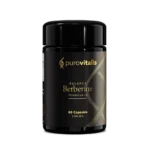
Have you ever thought about how our bodies manage energy and metabolism? At the heart of these mechanisms is an enzyme known as Adenosine monophosphate-activated protein kinase, or simply AMPK. It acts like an energy detector and has a big impact on how our bodies handle energy. When exploring AMPK activation and its importance, the questions that often arise are: What is AMPK? Why should we be concerned about the AMPK metabolic activator? The answers to these are deeply connected to our health, longevity, and overall well-being.
What is AMPK?
AMP-Activated Protein Kinase, or AMPK, is like a power switch inside your cells. It plays a big role in keeping your energy levels balanced. Imagine your body as a complex factory; it helps decide when to make more energy and when to conserve what you have, depending on how much you need. When you exercise or diet, AMPK activates and tells your body to start burning fat and making more energy. So, AMPK activation is crucial for staying energetic and healthy, and that’s why people are interested in AMPK metabolic activators—special helpers that turn it on, helping your body to efficiently manage its energy and keep you feeling great.
AMPK Benefits
AMPK acts like our body’s energy monitor. When our cells are low on energy, AMPK jumps into action. This enzyme is vital in shaping how our metabolism works and how much body fat we carry. As we grow older, our AMPK levels naturally decline, and this might explain why many of us put on extra pounds over the years (though our eating habits and daily routines play a part too). Researchers are always learning more about AMPK, but we already know some of the good things that happen when it’s active.
It Manages Energy and Fats
As our internal conductor, AMPK has the crucial task of determining how our cells use and store energy. Whenever it’s activated, it directs the body toward burning stored fat. At the same time, AMPK keeps our heart’s health in check by ensuring the regulation of blood fats like triglycerides and cholesterol.
Enhances Antioxidant
But it isn’t just about energy and fat. It has another important role – boosting the production of antioxidants in our body. These antioxidants combat the aging process and slow down the cell damage.
Fights Inflammation
Another important benefit of AMPK for our body it’s is capacity to fight inflammation. In fact, AMPK inhibits the inflammatory pathway NF-kB. High levels of NF-kB are associated with some chronic conditions like cardiovascular diseases, diabetes and obesity.
Regulates Blood Sugar Levels
Elevated blood sugar can harm our well-being. AMPK helps our body use glucose efficiently, turning it into energy (known as ATP) and moving it into our muscles. This process helps keep our blood sugar in check.
When AMPK gets to work in a part of our brain called the hypothalamus, it prompts the liver to produce more glucose. It does this by stopping the storage of glucose. This is particularly beneficial in tackling hypoglycemia – a situation where there’s too little blood sugar that can impair brain activities and overall stability.
AMPK and Aging: the Connection
As we journey through life, aging brings a natural decline in our AMPK levels. This often leads to increased weight gain, more visible belly fat, and a drop in overall energy. Various factors can suppress AMPK activity, from dietary choices rich in fats, glucose, and proteins, to lifestyle habits that can improve our insulin resistance.
If you are curious to discover more about aging and the hallmarks that scientists and researchers used to define age don’t miss our blog “Top Hallmarks of Aging and How to Define Them”.
Research suggests that AMPK might also help us live longer, especially when we eat fewer calories. It supports sirtuins, a group that’s essential for our cell health, which often gets less active as we grow older. By activating AMPK, we can keep these sirtuins working well.
Another thing AMPK does is keep mTOR in check. While mTOR helps our muscles grow and fixes our cells, too much of it is linked to some serious health issues like cancer and diabetes. So, having AMPK around to control mTOR is a good thing.
What are AMPK Metabolic Activators?
Fortunately, the story doesn’t end with the declining AMPK. We have the power to rejuvenate these levels naturally. Simple changes like embracing calorie restriction, indulging in regular physical activity, and adopting a diet abundant in fiber can make a world of difference.
Some supplements can also be powerful AMPK metabolic activators. Supplements containing lipoic acid, berberine, resveratrol, and quercetin offer substantial benefits in the quest to activate AMP-Activated Protein Kinase.
Resveratrol, one of these powerful AMPK activators, also contains anti-inflammatory, antioxidant, and even anti-aging properties.
Quercetin, on the other hand, is a flavonoid found in a variety of foods including onions, apples, berries, and tea. Like resveratrol, quercetin plays an important role in activating AMPK. Beyond this, quercetin can provide anti-inflammatory and antioxidant benefits. This can combat oxidative stress, a significant contributor to aging and various chronic diseases.
Including these compounds in one’s diet, whether through whole foods or as supplements, can be a game-changer for those looking to improve their health and benefits from the properties of AMPK activation.
There are also other natural ways to activate it. We can do it simply by eating a bit less, since caloric restriction is a natural AMPK activator. Exercising, especially intense workouts, do the same thing. Also, eating foods rich in fiber and polyphenols found in fruits and vegetables can help it to work better. But we have to be careful, too much fat, sugar, or even protein can slow AMPK down.
What are AMPK Inhibitors?
AMPK also has its weaknesses. In fact, some factors can act as inhibitors, reducing its efficiency. A diet high in fats, excessive sugar, or even too much protein can negatively impact AMPK’s activation. In fact, several studies found a link between a high-fat diet and decreased AMPK levels.
Talking about proteins, high levels of amino acid activates mTOR – the pathways responsible for building and repairing muscles. SMPK and mTOR are connected, and when mTOR is activated, it seems like AMPK is inhibited.
Excessive calorie intake it’s also an inhibiting factor. Eating more than you need will signal to your body that it’s time to build up the stores. Additionally, certain lifestyle factors such as chronic stress, sedentary behavior, and aging itself contribute to a decline in AMPK activity. It’s essential to be aware of these inhibitors because, over time, decreased AMPK function can lead to various health issues, like metabolic imbalances and reduced cellular energy.
Balancing AMPK and mTOR: Your Recipe for Health
While AMPK has gained attention for its role in metabolism and aging, it’s important to also mention another vital player: mTOR (mechanistic Target of Rapamycin). mTOR is a protein that regulates cell growth, proliferation, and survival. When nutrients are abundant, mTOR signals cells to grow, whereas AMPK signals energy conservation during times of scarcity. The balance between AMPK and mTOR is crucial for cellular health and longevity. Over activation of mTOR, often caused by high nutrient intake or certain health conditions, can contribute to age-related diseases and conditions.
Conclusion
Understanding AMPK is a big win for anyone interested in health and staying energetic. This tiny molecule works like a switch in our bodies, helping us use energy better, burn fat, and maybe even live healthier for longer. When we learn about AMPK and how to keep it active, we’re really learning how to keep our bodies in top shape. It’s like finding a secret tool that can help us feel better and live well. With something as simple as regular exercise or choosing the right foods, we can activate it, and that’s good news for our overall health. By focusing on AMPK, we’re not just going with the latest health trend—we’re making smart choices based on what scientists have discovered about keeping our bodies balanced and full of energy.
References
- https://www.sciencedirect.com/science/article/pii/S1568163711000778
- https://www.ncbi.nlm.nih.gov/pmc/articles/PMC5780224/
- https://www.ncbi.nlm.nih.gov/pmc/articles/PMC3078651/
- https://www.ncbi.nlm.nih.gov/pmc/articles/PMC7346208/
- https://pubmed.ncbi.nlm.nih.gov/17496363/
- https://pubmed.ncbi.nlm.nih.gov/28708087/

Berberine Balance protects heart optimizes metabolism Blood Sugar Control
While regular Berberine gets the job done, Dihydroberberine does it better, faster, and longer. Try it out!













